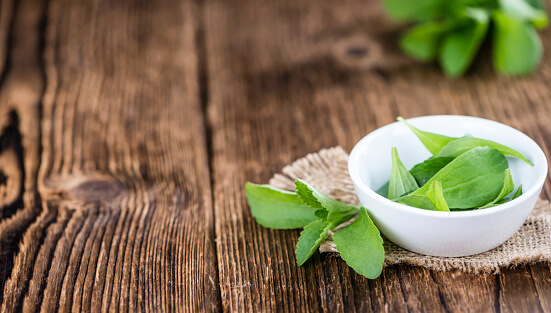Name Your Sweetener. One of Ours is Stevia!
8 years ago | Nutrition
By Joy Stephenson-Laws, JD, Founder
If your doctor has told you to stay away from sugar or maybe you are just trying to watch your calorie intake, you may have looked into alternative ways to sweeten your morning cup of coffee or tea.
So have you heard of stevia?
Stevia is a natural sugar and sweetener substitute that is extracted from the leaves of the plant species Stevia rebaudiana (which is a member of the chrysanthemum family). It is believed to have originated in Paraguay. It has zero calories, no carbohydrates and a glycemic index of zero.
There are generally three main types of stevia you can purchase: green leaf stevia (the least processed option), stevia extracts and altered stevia (like Truvia). You can use stevia to replace sugar in baking. With stevia, a little goes a long way. It is reportedly 100-300 times sweeter than table sugar.
Sounds too sweet to be true.
Let’s look more into the benefits of this natural sweetener.
“Although Stevia can be helpful to anyone, there are certain groups who are more likely to benefit from its remarkable sweetening potential. These include diabetic patients, those interested in decreasing caloric intake, and children. Stevia is a small perennial shrub that has been used for centuries as a bio-sweetener and for other medicinal uses such as to lower blood sugar,” according to the National Institutes for Health (NIH).
A 2010 study by the NIH found evidence that stevia lowered glucose and insulin levels in both lean and obese people. Recently, researchers explained in some detail how stevia controls blood sugar levels. Study participants also reported to feel full and satisfied despite a low calorie intake.
In addition to this, a 2009 study suggests stevia may help lower cholesterol.
“Results of intervention revealed that stevia extract intervention had positive and encouraging effects over lipid profile. No adverse effect was observed on the health status of the subjects and it can thus be concluded that the stevia extract intervention is effective in lowering the elevated levels of serum cholesterol, triglyceride, low density lipoprotein and very low density lipoprotein levels and increasing the HDL levels,” according to study notes.
In addition to this, several studies report stevia is rich in anti-inflammatory compounds and antioxidants that may help prevent cancer. It may even have antimicrobial properties and help fight bad bugs and infection.
Just because a substance is natural does not mean it is safe. And there are some reported downsides to stevia.
Most importantly, you have to be mindful of what stevia products you buy. Not all of them are created equal. Truvia, for example, has been reported to be chemically processed. Other stevia products may have sugar mixed in them in order to help mitigate some of the bitterness of natural stevia. So it’s important to look for “100 percent pure stevia extract” on the label, not “stevia powder.” To learn more about additives often added to many stevia products on the market, click here.
There is also an NIH report that suggested stevia may inhibit the growth of good bacteria in the gut.
Stevia may also interact with medications you may be taking, particularly medications you may be taking for diabetes, blood pressure and cancer. Talk to your doctor if you have any health issues and are interested in adding stevia to your diet.
At the end of the day, if you do use stevia it is probably a good idea to consume it in moderation.
Remember, a little goes a long way.
To learn more about stevia products around the world, click here.
Enjoy your healthy life!
The pH professional health care team includes recognized experts from a variety of health care and related disciplines, including physicians, attorneys, nutritionists, nurses and certified fitness instructors. This team also includes the members of the pH Medical Advisory Board, which constantly monitors all pH programs, products and services. To learn more about the pH Medical Advisory Board, click here.







